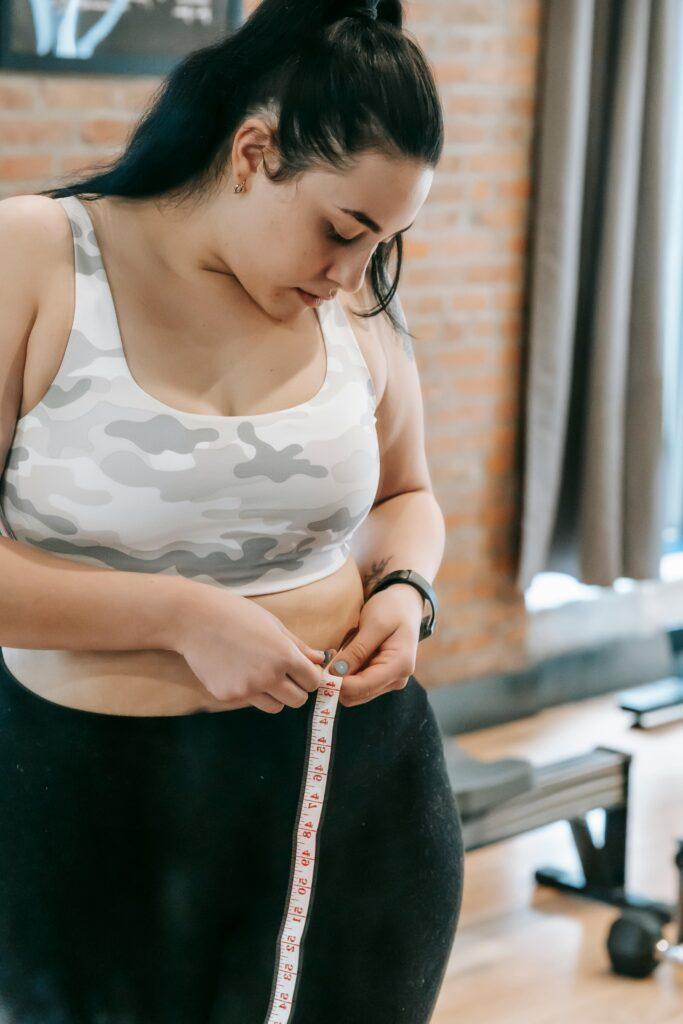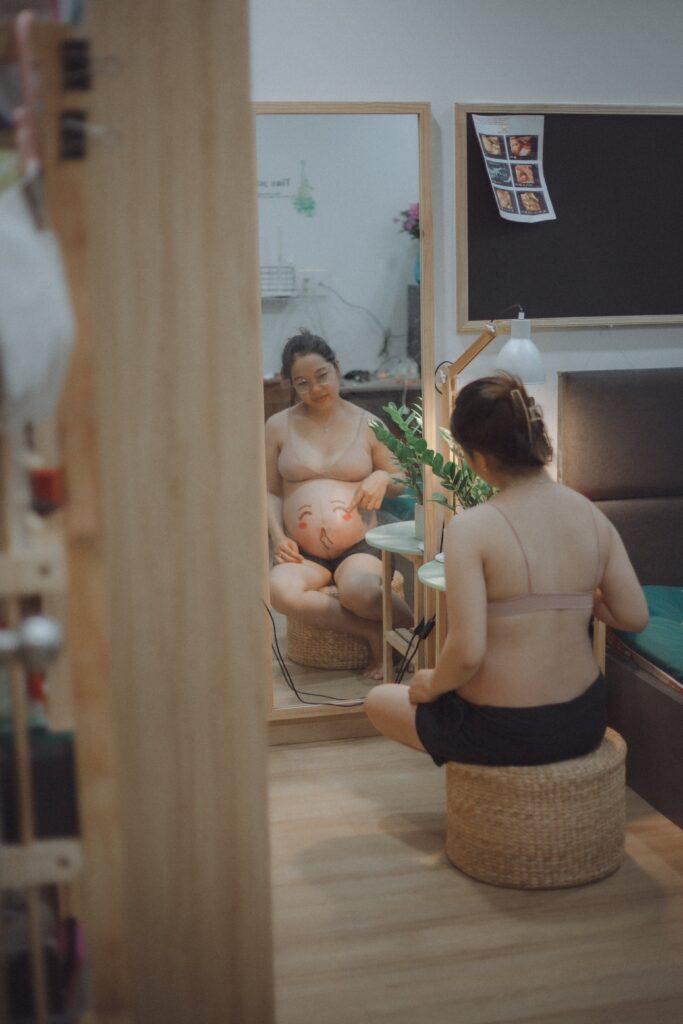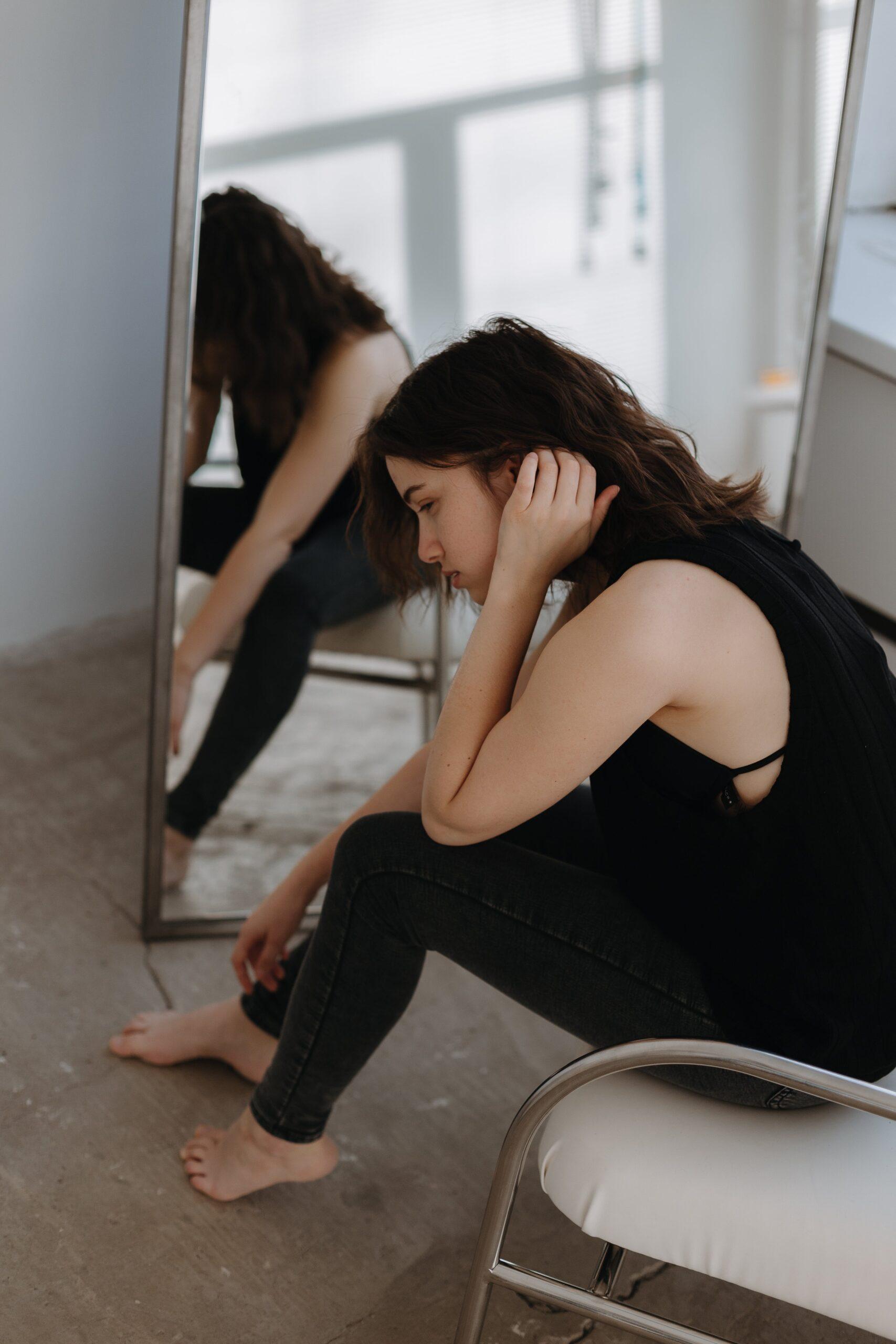Written By: Angela Bishop
Becoming a mother is an incredible journey, marked by profound changes that extend far beyond welcoming a new life, which reshapes not only our lives but also our bodies. It’s a transformative phase marked by a cascade of changes, both physical and emotional. One of the most significant transformations often lies within ourselves—the adjustment to our new bodies after childbirth. This personal evolution can be a rollercoaster of emotions, where feelings of awkwardness, unfamiliarity, and a yearning for the past can intertwine with love, gratitude, and awe for the miracle of new life.
As a therapist, I’ve witnessed firsthand the emotional whirlwind that accompanies postpartum body adjustments. It’s a delicate balance of marveling at the miracle your body has accomplished while feeling a sense of unfamiliarity within your own skin.
The Complexity of Postpartum Body Image
The postpartum period is a time of tremendous adjustment, both physically and emotionally. While there is an undeniable joy in bringing new life into the world, it often comes hand-in-hand with a sense of displacement within our own bodies. The changes—stretch marks, weight fluctuations, a different silhouette—can sometimes leave us feeling like strangers to ourselves.
1. Feeling Unsettled in Your Skin:
It’s entirely natural to feel awkward or unfamiliar in your postpartum body. For many new mothers, the changes in their bodies can lead to feelings of disconnection. The clothes that once fit perfectly may no longer drape the same way, and the reflection in the mirror might seem like an altered version of yourself. This all leading to a sense of unease and discomfort.

Consider Sarah, a new mom, found herself constantly adjusting to her changed body. The stretch marks and the way her clothes hugged her differently left her feeling unsettled and self-conscious.
2. The Desire for Change:
It’s not uncommon for new mothers to wish to return to their pre-pregnancy bodies. The desire for familiarity and comfort in their own skin often translates into a longing for physical transformation. This can be especially true when everything else in her life seems to be new and chaotic. Overwhelmed by the uncertainty of this new role, she may crave the comfort of her old self.
Example: Jane struggled with the changes in her body post-pregnancy. She found herself yearning to fit into her old jeans, craving the physical familiarity she once had. A resemblance of who she used to be.
The yearning for familiarity and comfort in one’s skin often translates into a wish for physical transformation.
3. Complexities of Gratitude and Insecurity:
While there’s immense gratitude for the miracle of giving birth, there can also be simultaneous feelings of insecurity and a desire to change certain physical aspects.
For instance, Rachel marveled at her body’s ability to carry and birth her child. However, the changes in her appearance sometimes triggered moments of insecurity, making her yearn for her pre-pregnancy physique.

Navigating the Emotional Landscape:
1. Accepting the Emotional Rollercoaster:
Allow yourself the space to experience the full spectrum of emotions without judgment. Acknowledge that feeling a mix of love, gratitude, insecurity, and a desire for change is perfectly normal.
1. Embracing Self-Compassion:
While acceptance is a beautiful concept, it’s crucial to understand that it’s okay not to fully accept or love every aspect of your postpartum body immediately. Self-compassion means acknowledging your feelings without judgment.
Example: Emily recognized that while she cherished the new life she brought into the world, she struggled with self-acceptance. Embracing self-compassion helped her navigate these conflicting emotions.
Practice self-compassion by treating yourself with kindness and understanding. Remind yourself that your body has achieved something miraculous, and it’s okay to navigate the transition at your own pace.
3. Validation of Your Feelings:
Your feelings are valid. You can love and appreciate the miracle of your body while also desiring changes. It’s not contradictory; it’s the human experience of growth and transformation.
Challenging the narrative of “acceptance” involves validating the desire for change. It’s okay to wish for physical alterations while still respecting and appreciating your body’s strength and resilience.
Example: Mia found herself torn between loving her body for giving her a child and wanting to regain her pre-pregnancy body“`. She acknowledged both desires as valid and essential parts of her emotional journey.
1. The Reality of Body Changes:
Acknowledge that some of the changes in your body might not be reversible or happen as quickly as desired. Pregnancy alters us in profound ways, and acceptance is a crucial part of the journey.
2. Coping with External Pressure:
External pressure, whether from societal ideals or comparisons with other mothers, can add to the emotional burden. Remember, your journey is unique, and comparison serves no purpose in your healing process.
3. Prioritizing Self-Care:
Focus on self-care that goes beyond physical appearance. Nourish yourself with activities that promote mental and emotional well-being, fostering a sense of inner strength and acceptance.
Navigating the Road Ahead:
1. Realistic Expectations:
Instead of aiming solely for acceptance, focus on setting realistic expectations. Recognize that it’s okay to desire change but allow yourself the grace and patience to embrace the journey at your own pace.
Example: Laura set realistic expectations for herself, understanding that her body might take time to readjust. She accepted the changes while also working towards her fitness goals gradually.

2. Embracing Self-Love in Transformation:
If weight loss is a goal, approach it with self-love. Focus on nourishing your body with healthy choices rather than punishing it. Embrace exercise as a way to feel strong and energized, not solely to alter appearance. View it as self-care and as an act of self-love.
Example: Olivia found joy in nurturing her body with healthy habits, celebrating each step of progress not only for its physical aspect but also for the mental and emotional strength it provided.
Loving Your Body While Striving for Change
1. Embracing Gratitude for Your Body:
Practice gratitude for the incredible journey your body has taken—bringing forth life, nurturing, and sustaining your baby. Celebrate the strength and resilience it embodies.
Conclusion: Embracing the Journey with Compassion
Adjusting to your new body after becoming a new mom is a journey of profound emotional depth. It’s about navigating the complexities of feeling unfamiliar in your skin while embracing the gratitude and love for the miraculous journey your body has undergone.
Remember, it’s okay to feel a range of emotions—awkwardness, desire for change, gratitude, and love—all simultaneously. Embrace self-compassion, acceptance, and patience as your body transitions. Your worth is not solely defined by your appearance but by the incredible love, care, and life you nurture as a mother. Embrace the journey with compassion, for it’s in this acceptance and self-love that you find the true beauty and strength of your postpartum self.
If you feel like you need more support navigating this transition in your life, please feel free to reach out to Bloom & Thrive Therapy and learn more about our therapy for moms.








